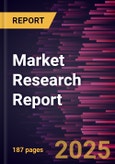Executive Summary and Market Analysis
This market encompasses key regions including Saudi Arabia, the UAE, South Africa, and the broader Middle East and Africa. The anticipated growth is driven by rising incidences of chronic conditions such as diabetes and cancer, alongside an aging population that necessitates increased medical care. Notably, the UAE is expected to emerge as the fastest-growing market due to its expanding medical tourism sector.Market Segmentation
The infusion devices market is categorized based on product type, application, and end user:
1. Product Type: The market is divided into infusion pumps and infusion sets, with infusion pumps dominating the market share in 2023. Within infusion pumps, volumetric pumps, syringe pumps, insulin pumps, patient-controlled analgesia (PCA) pumps, enteral pumps, implantable pumps, and elastomeric pumps are included. Volumetric pumps held the largest market share in this category. Infusion sets are further classified into vented and non-vented sets, with vented sets leading in market share.2. Application: The market is segmented into diabetes, oncology, pain management, hematology, pediatrics, gastroenterology, and others. Diabetes applications accounted for the largest share in 2023.
3. End User: The end users include hospitals and specialty clinics, homecare settings, ambulatory surgical centers, and others, with hospitals and specialty clinics holding the largest market share.
Market Outlook
The healthcare sector is witnessing rapid technological advancements, particularly in IV infusion systems. Innovations such as smart pumps, wireless connectivity, and electronic health record (EHR) integration are enhancing operational efficiency and patient safety. For instance, Baxter's Novum IQ Large Volume Infusion Pump, which received FDA clearance in April 2024, exemplifies the trend towards connected infusion therapy, offering smart pumps that ensure accurate dosing and improve clinician efficiency.Remote monitoring capabilities are also transforming infusion therapy management, allowing healthcare providers to oversee multiple infusion setups from a centralized location. Infuzamed's mobile, wearable infusion pump is a notable example, providing advanced remote monitoring without the encumbrance of traditional equipment.
The integration of infusion systems with electronic health records streamlines documentation and enhances data accessibility, which is crucial for operational efficiency. WellSpan Health's implementation of the Alaris System across its hospitals illustrates this trend, enabling bidirectional interoperability between infusion devices and EHRs.
User interface improvements are also critical, as intuitive designs reduce the likelihood of errors during administration. B. Braun's infusion pumps, which share a common user interface and drug library, highlight the focus on enhancing user experience.
Country Insights
The market analysis reveals that Saudi Arabia held the largest share in 2023. The healthcare landscape in Saudi Arabia is evolving, driven by technological advancements and a growing emphasis on research and development. The demographic shift towards an aging population is increasing the demand for healthcare services, particularly for chronic diseases like diabetes and cardiovascular conditions. According to the International Diabetes Federation, approximately 4.27 million adults in Saudi Arabia were diagnosed with diabetes in 2021, indicating a prevalence rate of 17.7%. This trend underscores the need for effective infusion therapies that minimize adverse effects.Company Profiles
Key players in the Middle East and Africa infusion devices market include B Braun SE, Baxter International Inc, Becton Dickinson and Co, BPL Medical Technologies Pvt Ltd, CODAN US Corp, Eitan Medical Ltd, Elimedical Inc, Fresenius Kabi AG, ICU Medical Inc, KD Scientific Inc, Medtronic Plc, Moog Inc, Nipro Corp, Polymedicure, Tandem Diabetes Care Inc, Terumo Corp, and Zimed Healthcare Ltd. These companies are pursuing strategies such as market expansion, product innovation, and mergers and acquisitions to enhance their offerings and increase market share.In summary, the Middle East and Africa infusion devices market is poised for significant growth, driven by technological advancements and increasing healthcare demands.
Reasons to Buy
- Save and reduce time carrying out entry-level research by identifying the growth, size, leading players, and segments in the Middle East & Africa infusion devices market.
- Highlights key business priorities to assist companies to realign their business strategies.
- The key findings and recommendations highlight crucial progressive industry trends in the Middle East & Africa infusion devices market, thereby allowing players across the value chain to develop effective long-term strategies.
- Develop/modify business expansion plans by using substantial growth offering developed and emerging markets.
- Scrutinize in-depth Middle East & Africa market trends and outlook coupled with the factors driving the Middle East & Africa infusion devices market, as well as those hindering it.
- Enhance the decision-making process by understanding the strategies that underpin commercial interest with respect to client products, segmentation, pricing, and distribution.
Table of Contents
Companies Mentioned
Some of the leading companies in the Middle East & Africa Infusion Devices Market include:
- B Braun SE
- Baxter International Inc
- Becton Dickinson and Co
- BPL Medical Technologies Pvt Ltd
- CODAN US Corp
- Eitan Medical Ltd
- Elimedical Inc
- Fresenius Kabi AG
- ICU Medical Inc
- KD Scientific Inc
- Medtronic Plc
- Moog Inc
- Nipro Corp
- Polymedicure
- Tandem Diabetes Care Inc
- Terumo Corp
- Zimed Healthcare Ltd








